| Srl | Item |
| 1 |
ID:
122752
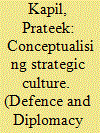

|
|
|
| 2 |
ID:
128324
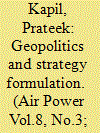

|
|
|
|
|
| Publication |
2013.
|
| Summary/Abstract |
Is there a limit to human will? Is geography a constraint or a legitimate determinant which checks human zeal? Are political geographers overtly deterministic in their analyses and detached to the possibilities of human capabilities? Or are they prudent realists who see the world as it is and not how it should be? These questions from the essence of the use of geopolitics in strategy formulation. It is often rued that American power oscillates among the Vietnam psyche of interventionism, regime change, human rights and promulgation of the liberal international system even at stretched cost. The wars of Iraq and Afghanistan are symptomatic of the former while the Yugoslavian war intervention was symptomatic of the latter. Renowned strategist Robert D Kaplan argues that while there are many human process at work, such extremes can be avoided if nations priorities one major factor in their calculation: geography.
|
|
|
|
|
|
|
|
|
|
|
|
|
|
|
|
| 3 |
ID:
119126
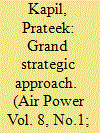

|
|
|
| 4 |
ID:
126281
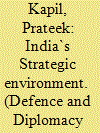

|
|
|
|
|
| Publication |
2013.
|
| Summary/Abstract |
In a nutshell, grand strategy is fundamentally a choice; it reflects a preference for a future state or condition in the strategic environment. Therefore, strategy at the state level can be defined as the art an d science of developing and using the political, economic, socio-psychological and military power of the state to create strategic effect that protect or advance national interests in the environment in accordance with policy guidance. Strategy seeks synergy and symmetry of objectives, concepts, and resources to increase the probabilities and favourable consequence of policy success and to lessen the chances of policy failure.
|
|
|
|
|
|
|
|
|
|
|
|
|
|
|
|
| 5 |
ID:
119629


|
|
|
| 6 |
ID:
132587
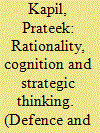

|
|
|
|
|
| Publication |
2014.
|
| Summary/Abstract |
A fundamental debate in international relations pertains to the application of rationality and context to different situations. Rationality is a hugely debated concept in philosophy. Across disciplines, the conceptualization of rational thought and practice provides various puzzles and problems. Yet, it is the most in?uential concept in modern day parlance and forms the foundations of approaching any problem. To be rational, according to Plato, is to let reason govern all intrinsic human thinking. He says reason is the supreme quality of human beings which gives them their unique character. The internal re?ective process of a human being is what gives him/ her an evolutionary advantage. Knowledge, according to rationality, is
innate and achieved through continuous reflection and processing. One's surroundings, undoubtedly, constrain or enable reason but the latter is the final instrument through which human beings have the ability to shape the environment to their advantage. Aristotle considered reason analogous to a charioteer who steers the seemingly irrational aspects of human thinking i.e. spirit and appetite. Further, there are myriad debates within the concept of rationality itself.
|
|
|
|
|
|
|
|
|
|
|
|
|
|
|
|